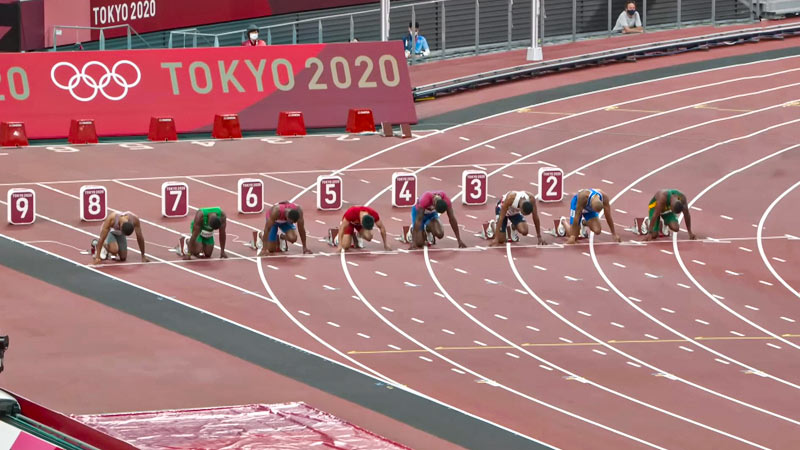In the ever-evolving landscape of sports, the question of whether Olympic athletes can be professionals has been a topic of significant discussion and transformation.
From the historical roots of strict amateurism to the modern era’s acceptance of professionalism, this blog explores the journey of Olympic athletes breaking away from traditional constraints.
The narrative encompasses rule changes, controversies, and the profound impact of professionalism on the quality of competition, training methods, and the globalization of sports.
As the distinction between amateur and professional blurs, this exploration delves into the multifaceted aspects that shape the present-day Olympian and the dynamic nature of the Olympic Games.
Can Olympic Athletes Be Professionals
It’s a common question for beginners can you be a professional in the Olympics? Also, people often get confused about whether can a professional athlete compete in the Olympics.
Yes, Olympic athletes can be professionals. In the past, the Olympics were restricted to amateur athletes, meaning individuals who did not receive payment for their participation in sports.
However, this rule was changed, and since the 1992 Summer Olympics in Barcelona, professional athletes have been allowed to compete.
Today, many Olympic athletes are professionals who earn a living through their sport. They may receive sponsorships, endorsements, and salaries from their respective sports organizations or teams.
The change in the rules has allowed for greater participation of top athletes in the Olympics, enhancing the overall level of competition and contributing to the global popularity of the Games.
Historical Perspective: Are Olympic Athletes Professionals
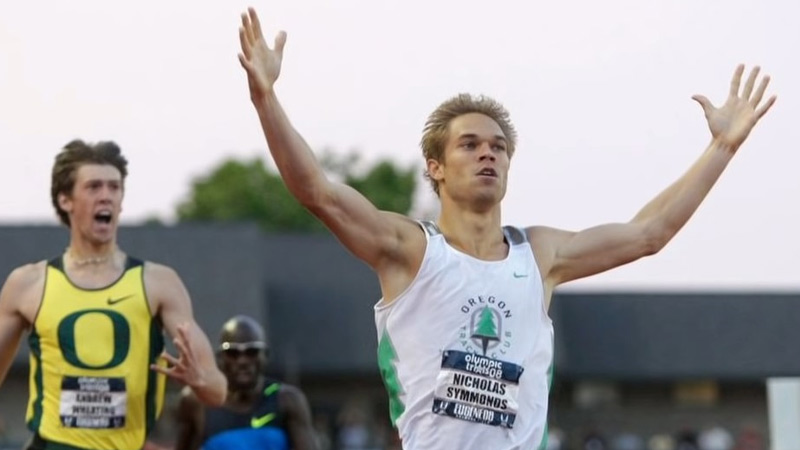
Historically, the status of Olympic athletes has undergone significant changes, particularly regarding their amateur or professional standing. Here’s an elaboration on this historical perspective with four key points:
Amateurism Tradition (19th to mid-20th century)
In the early years of the modern Olympic Games, the emphasis was on amateurism. Athletes were expected to participate purely for the love of sport, and financial compensation for their efforts was generally frowned upon.
The Olympic Charter, which outlines the rules and principles of the Olympic Movement, initially adhered strictly to the concept of amateurism.
Athletes were prohibited from receiving payment or financial benefits directly related to their sports activities.
Shift Towards Professionalism (Late 20th century)
Over time, the definition of amateurism became increasingly blurred as athletes faced challenges balancing their commitment to training with the financial realities of sustaining an elite athletic career.
This led to a gradual shift in the Olympic landscape, culminating in significant changes in the late 20th century.
The International Olympic Committee (IOC) began to relax its stance on amateurism, recognizing the need to accommodate the evolving nature of sports and the demands on athletes.
Rule Change and Inclusion of Professionals (1992 onwards)
The pivotal moment in the shift towards professionalism came with the decision made before the 1992 Summer Olympics in Barcelona.
The IOC officially allowed professional athletes to participate, ending the longstanding requirement of strict amateur status.
This change opened the door for top athletes from various sports, including basketball, tennis, and soccer, to compete in the Olympics without jeopardizing their professional careers.
The move was aimed at ensuring the highest level of competition by allowing the best athletes in the world to participate.
Impact on Olympic Athletes and the Games
The inclusion of professionals has had a profound impact on the Olympics. It elevated the overall quality of competition as top-tier athletes, who would have otherwise been excluded, brought their skills and experiences to the Games.
Professionalism allowed athletes to pursue their sports careers without financial constraints, leading to increased specialization, higher levels of training, and advancements in sports technology.
This, in turn, contributed to the breaking of records and the pushing of athletic boundaries during the Olympic Games.
The shift also facilitated greater corporate sponsorship and endorsement opportunities for athletes, turning the Games into a platform for both sporting excellence and commercial exposure.
The historical perspective on Olympic athletes’ professionalism reflects a transition from strict amateurism to a more inclusive approach that recognizes and accommodates the professional commitments of athletes while maintaining the spirit of fair competition and excellence in the Olympic Games.
Can Pro Athletes Compete in the Olympics: The Modern Olympic Athlete
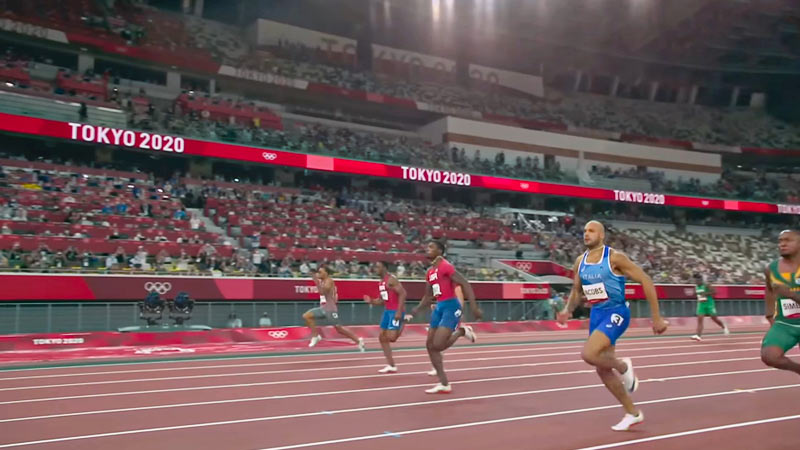
Are Olympians professional athletes? You must have this question in your mind. Absolutely, professional athletes can and do compete in the modern Olympics.
This represents a significant shift from the historical emphasis on amateurism. Here are several points to elaborate on the involvement of professional athletes in the Olympics:
End of Strict Amateurism
The notion of amateurism was integral to the early Olympic Games. Athletes were expected to participate purely for the love of sport, without financial compensation.
This perspective began to change in the latter half of the 20th century.
Changing Landscape
As sports evolved, the expenses associated with training and competition increased. Athletes faced challenges sustaining themselves without financial support.
The IOC recognized this reality and started to reconsider the strict amateurism rules.
1986 Decision
In 1986, the International Olympic Committee (IOC) made a groundbreaking decision to allow professional athletes to compete in the Olympics.
This marked a departure from the traditional emphasis on amateurism and opened the doors for athletes who earned a living through their sports.
1992 Barcelona Olympics
The first Olympics to fully embrace the inclusion of professional athletes was the 1992 Summer Olympics in Barcelona.
Athletes from various professional sports, such as basketball and tennis, participated on the grand Olympic stage.
Basketball and Dream Team
One of the most iconic examples of professional athletes in the Olympics is the USA Basketball “Dream Team” that competed in Barcelona in 1992.
Comprising NBA superstars like Michael Jordan, Magic Johnson, and Larry Bird, the Dream Team showcased the level of talent professional athletes could bring to the Olympic Games.
Expanding to Various Sports
Over time, the inclusion of professional athletes extended beyond basketball and tennis to various other sports.
Athletes from professional leagues worldwide, including soccer, hockey, and golf, regularly participate in the Olympics.
Sponsorships and Endorsements
Many Olympic athletes are now able to secure sponsorships and endorsements, contributing to their status as professionals.
These financial opportunities enable them to focus on training and competition without the financial constraints that strict amateurism once imposed.
Enhanced Competition
The participation of professional athletes has elevated the level of competition at the Olympics.
It brings together some of the best talents in the world, making the Games more exciting and globally appealing.
Global Recognition
The involvement of professional athletes has increased the global recognition and popularity of the Olympic Games.
Fans are drawn to see their favorite professional athletes competing on a stage that transcends their usual professional leagues.
Balancing Act
While professional athletes are allowed to compete, there are still eligibility rules and considerations to maintain the spirit of fair competition.
Athletes must adhere to certain criteria to ensure that the essence of the Olympic Games, which promotes fair play and sportsmanship, is preserved.
The modern Olympic athlete is often a professional who competes at the highest level in their respective sports. This shift from strict amateurism has contributed to the continued success and global appeal of the Olympic Games.
Controversies: Can Pros Play in the Olympics
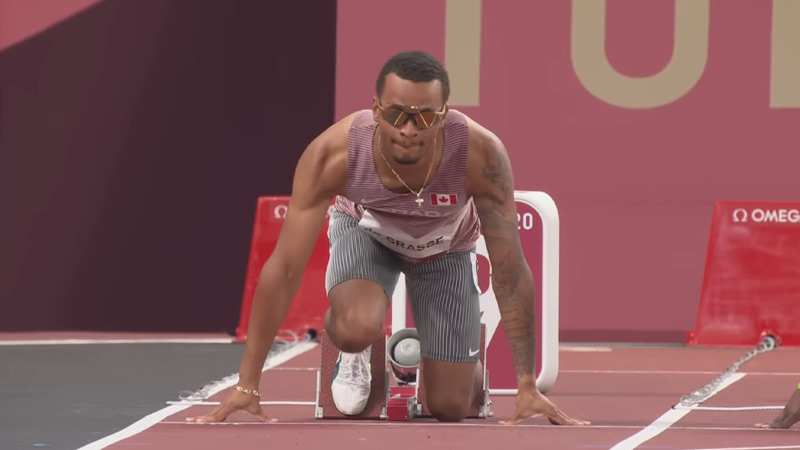
The inclusion of professional athletes in the Olympics has been a source of both support and controversy. Here are some key points highlighting the controversies surrounding the participation of professionals in the Olympics:
Equity and Fairness
One of the primary controversies is related to the perceived inequity in competition.
Critics argue that allowing professionals to compete may create an uneven playing field, as some sports have well-established professional leagues that provide athletes with extensive training resources, while others do not.
In sports where professional leagues exist, athletes from these leagues may have a significant advantage over those from countries or sports without a robust professional infrastructure.
Commercialization and Sponsorship
The shift towards professionalism in the Olympics has led to increased commercialization and sponsorship.
Some critics argue that the inclusion of professional athletes has turned the Games into a showcase for individual brands and commercial interests, potentially overshadowing the amateur spirit on which the Olympics were originally founded.
The concern is that the focus on high-profile, marketable athletes may detract from the essence of the Olympics as a celebration of amateur sports and global unity.
Elitism and Exclusivity
Another point of contention is the perception of the Olympics becoming an event primarily for elite, well-funded athletes.
Some argue that the Games should maintain a balance by preserving opportunities for amateur athletes, who may lack the financial support enjoyed by professionals.
Critics expressed concerns that certain sports or countries might be marginalized if they cannot compete at the same professional level as others, potentially discouraging participation and diversity in the Olympic Games.
Impact on Smaller Nations
The inclusion of professional athletes can pose challenges for smaller or less economically developed nations.
These countries may struggle to support a professional sports infrastructure, putting their athletes at a disadvantage compared to those from wealthier nations with established professional leagues.
This raises questions about whether the Olympics, in its current form, truly represents a fair and level playing field for all participating nations.
While the inclusion of professional athletes in the Olympics has enhanced the overall quality and competitiveness of the Games, it has not been without its share of controversies.
Striking a balance between allowing the world’s best athletes to compete and maintaining the spirit of fairness and inclusivity continues to be a subject of debate within the Olympic community and among fans of the Games.
Impact of Professionalism on Olympic Sports
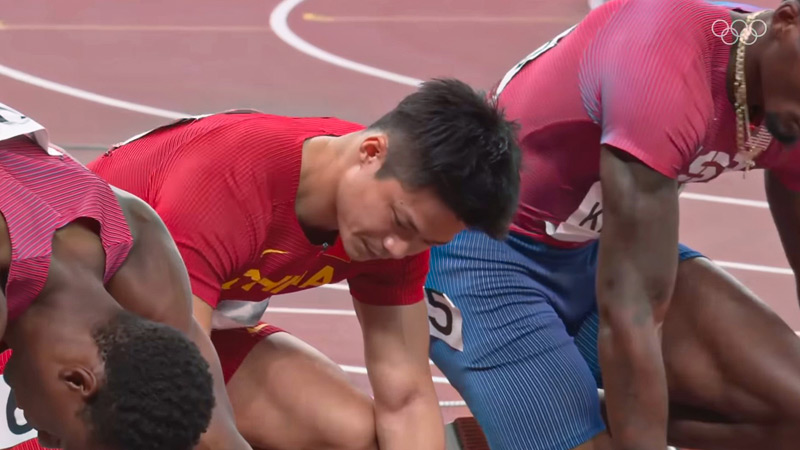
The impact of professionalism on Olympic sports has been multifaceted, influencing various aspects of the Games, athletes, and the overall sporting landscape.
Here are several key ways in which the shift toward professionalism has shaped Olympic sports:
Increased Quality of Competition
One of the most significant impacts of professionalism on Olympic sports has been the elevation of the overall quality of competition.
Allowing professional athletes to participate has brought the best talents from around the world to the Olympic stage, enhancing the level of skill and performance in numerous sports.
In events such as basketball, tennis, and soccer, where professionals have been participating since the rule change in 1992, spectators witness top athletes showcasing their skills, resulting in more intense and closely contested competitions.
Advancements in Training and Technology
The shift towards professionalism has led to increased investment in athlete training, sports science, and technology.
Professional athletes often have access to state-of-the-art facilities, specialized coaching, and advanced equipment, which has contributed to improvements in performance across various Olympic disciplines.
This emphasis on cutting-edge training methods and technology has not only benefited individual athletes but has also raised the overall standard of competition as training techniques filter down to other levels of sports development.
Globalization and Diversity
The participation of professional athletes in the Olympics has contributed to the globalization and diversification of sports.
Athletes from different regions and cultural backgrounds, who may not have had the opportunity to compete at the highest level in the past, now have a platform to showcase their talents on the international stage.
This increased diversity enhances the cultural richness of the Olympics and promotes a sense of global unity through the shared love of sport.
Commercialization and Sponsorship
The influx of professional athletes has brought increased commercialization and sponsorship to the Olympic Games.
High-profile athletes attract corporate sponsors, contributing to the financial sustainability of both individual athletes and the Games themselves.
While this has brought additional resources to support athletes and enhance the quality of the Games, it has also led to debates about the balance between commercial interests and the original amateur ethos of the Olympics.
Inspiration and Role Models
Professionalism has allowed Olympic athletes to become year-round competitors, serving as role models and inspirations for aspiring athletes.
This shift has led to a greater emphasis on sports as a viable career path, encouraging more individuals to pursue excellence in their chosen disciplines.
The presence of established professionals in the Olympic Games can motivate younger athletes, fostering a positive cycle of talent development and increasing interest and participation in various sports.
The impact of professionalism on Olympic sports has been transformative, influencing the caliber of competition, the way athletes train and prepare, the diversity of participants, the financial landscape of sports, and the role of athletes as global ambassadors.
While it has brought about positive changes, ongoing discussions, and considerations are necessary to ensure that the essence of the Olympic spirit is preserved amid the evolving landscape of professional sports.
FAQs
Can professional athletes compete in the Olympics?
Yes, the eligibility rules for the Olympics have evolved. Previously, only amateurs were allowed, but since the 1980s, professionals have been welcomed.
Many sports now permit athletes who earn their primary income from their sport to participate in the Olympics.
Can professionals compete in the Olympics?
Absolutely. The International Olympic Committee (IOC) revised its rules to allow professionals to compete.
Athletes from various sports, including basketball, soccer, and tennis, often feature seasoned professionals who bring a high level of skill and experience to the Olympic arena.
Can you be a professional athlete in the Olympics?
Yes, aspiring athletes can pursue professional careers and still compete in the Olympics.
The key criterion is not whether an athlete is a professional, but rather their adherence to the specific eligibility criteria set by each sport’s governing body and the IOC.
Are athletes professional?
Athletes can be either professional or amateur, depending on their source of income from their sport.
While some earn a living through sponsorships and competitions, others maintain amateur status. Olympic eligibility considers various factors, ensuring fair and inclusive competition.
Are Olympic athletes considered professionals?
Olympic athletes may or may not be professionals. The term “Olympic athlete” encompasses individuals from diverse backgrounds—some are seasoned professionals, while others maintain amateur status.
The evolving landscape of Olympic eligibility accommodates both, emphasizing the spirit of competition and excellence.
Wrapping Up
In conclusion, the integration of professionals into the Olympic arena has redefined the Games, elevating them to new heights of competition and global representation.
The fusion of tradition and modernity, exemplified by athletes balancing professionalism with the essence of the Olympic spirit, showcases the resilience and adaptability inherent in the world of sports.
As the pursuit of excellence continues, the harmonious coexistence of professionalism and the Olympic ethos marks a pivotal chapter in the ongoing narrative of athletic achievement and global unity.

